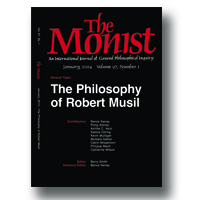|
articles |
|
21.
|
The Monist:
Volume >
96 >
Issue: 2
Terence Horgan
Original Intentionality is Phenomenal Intentionality
view |
rights & permissions
| cited by
|
|
|
|
|
22.
|
The Monist:
Volume >
96 >
Issue: 2
Anil Gupta
The Relationship of Experience to Thought
view |
rights & permissions
| cited by
|
|
|
|
|
23.
|
The Monist:
Volume >
96 >
Issue: 2
Laureano Luna
Indefinite Extensibility in Natural Language
abstract |
view |
rights & permissions
| cited by
The Monist’s call for papers for this issue ended: “If formalism is true, then it must be possible in principle to mechanize meaning in a conscious thinking and language-using machine; if intentionalism is true, no such project is intelligible.”We use the Grelling-Nelson paradox to show that natural language is indefinitely extensible, which has two important consequences: it cannot be formalized and model theoretic semantics, standard for formal languages, is not suitable for it. We also point out that object-object mapping theories of semantics, the usual account for the possibility of nonintentional semantics, do not seem able to accountfor the indefinitely extensible productivity of natural language.
|
|
|
|
|
24.
|
The Monist:
Volume >
96 >
Issue: 1
Roberta De Monticelli
Constitution and Unity:
Lynne Baker and the Unitarian Tradition
abstract |
view |
rights & permissions
| cited by
Lynne Baker’s Constitution Theory seems to be the farthest-reaching and yet the most subtly elaborated antireductive metaphysics available today. Its original theoretical contribution is a nonmereological theory of material constitution, which yet has a place for classical and Lewisian mereology (this formalized version of Materialism). Constitution Theory hence apparently (i) complies with modern natural science, and yet (ii) rescues the concrete everyday world, and ourselvesin it, from ontological vanity or nothingness, and (iii) does it by avoiding dualism. Why, then, does it meet so many opponents—or rather, why are its many opponents so stubbornly resisting the very idea of constitution, in Baker’s form? One of the most resisted claims is (iii). Is unity without identity—the feature distinguishing the relation between constituting and constituted things—the only nondualist way to oppose reductionism? What would be the price to pay for unity with identity—without reduction? What I (jokingly) call the Unitarian Tradition, going back to Plato, keeps working out the original Platonic way of constructing acomplex object as a Unity comprising a Collection, as opposed to the Aristotelian suggestion of opposing Collections and Substances. For once you have split things apart ontologically, unifying them again may prove a very hard task.
|
|
|
|
|
25.
|
The Monist:
Volume >
96 >
Issue: 1
Lynne Rudder Baker
Technology and the Future of Persons
view |
rights & permissions
| cited by
|
|
|
|
|
26.
|
The Monist:
Volume >
96 >
Issue: 1
Amie L. Thomasson
The Ontological Significance of Constitution
view |
rights & permissions
| cited by
|
|
|
|
|
27.
|
The Monist:
Volume >
96 >
Issue: 1
Tessa Jones
The Constitution of Events
abstract |
view |
rights & permissions
| cited by
Donald Davidson argues that ‘the stabbing of Caesar’ and ‘the killing of Caesar’ are two descriptions of the one event whereas Jaegwon Kim contends events are more fine-grained and two events occurred, related by supervenience. I argue that neither solution is satisfactory and, inspired by Lynne Rudder Baker, I develop a constitution relation governing cooccurring, co-located events such that the stabbing of Caesar comes to constitute the killing of Caesar when the stabbing occurs in the appropriate circumstances. According to my view, the stabbing of Caesar is metaphysically distinct from the killing of Caesar such that the killing is dependent on the stabbing, yet is not identical to it.
|
|
|
|
|
28.
|
The Monist:
Volume >
96 >
Issue: 1
Ingvar Johansson
Constitution as a Relation within Mathematics
view |
rights & permissions
| cited by
|
|
|
|
|
29.
|
The Monist:
Volume >
96 >
Issue: 1
Harold Noonan
Moderate Monism, Sortal Concepts, and Relative Identity
view |
rights & permissions
| cited by
|
|
|
|
|
30.
|
The Monist:
Volume >
96 >
Issue: 1
E.J. Lowe
Mereological Extensionality, Supplementation, and Material Constitution
view |
rights & permissions
| cited by
|
|
|
|
|
31.
|
The Monist:
Volume >
96 >
Issue: 1
Andrew Newman
On the Constitution of Solid Objects out of Atoms
view |
rights & permissions
| cited by
|
|
|
|
